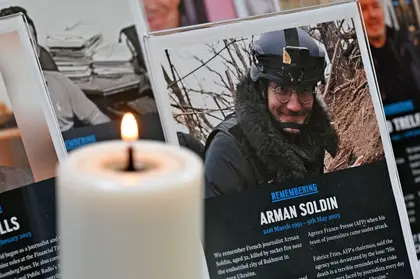I could talk for hours about why I love my job, but I still can’t put it into words. Never. However, today, June 6, I want to talk about the importance and danger of working as a journalist in Ukraine, because this is something that cannot be kept silent.
Russia has committed more than 514 crimes against journalists. And this is only during the period of the great war. Such data was published in its interim report by the Institute of Mass Information, which monitors the situation with mass media in Ukraine. This includes both cyber attacks on websites and attacks on journalists, capture of media persons and even murders.
JOIN US ON TELEGRAM
Follow our coverage of the war on the @Kyivpost_official.
How Russia “struggles” with the truth
At first, it all started with the fact that the Russians offered a number of Ukrainian mass media to switch to their side: to write news about the “good Russia,” which came for nothing else than to liberate the people who fell under the oppression of Europe. I don’t want to delve into it, however, there were many journalists who, without thinking long, agreed to such conditions.
However, it is important to note that these were not just Ukrainian journalists - they were those who were waiting for the “Russian world.” In particular, some journalists who worked in the so-called media of Medvedchuk (former Deputy of Ukraine, and Putin’s close friend). [Putin is the godfather of Medvedchuk’s daughter, who is currently a student in Moscow – ed.]

N. Korean Troops Massed in Russia to Enter Ukraine War ’Soon’: Pentagon Chief
A vivid example is the propagandist Diana Panchenko [a pro-Kremlin host formerly on Ukrainian TV – ed.], who is currently included on Ukraine’s sanctions list.
Those journalists who did not agree to cooperate began to receive threats: criminal liability when Russia “caught” them, or physical reprisals. Threats were sent from Russian domains to emails or from Russian numbers to personal messengers of journalists.
At the same time, Ukrainian websites were subjected to cyber attacks by Russian hackers. The Institute of Mass Information is aware of at least 67 cases of threats and harassment.
It would be great if everything ended with threats, but Russia still managed to capture Ukrainian territories. And the work on cooperation started almost from the first days of the occupation. They came to the journalists’ homes. If they were not there, they took their personal belongings, including documents and computers, if they were at home, the militants took them captive.
Officially, at least 21 cases of capture are known today. This is without taking into account the cases where we still do not know what happened to some media persons. They are still considered missing.
As for the prisoners, some journalists were detained at home. Some during editorial tasks. There are journalists who were fired. But there are also those who have been in captivity for more than a year.
Let me remind you, journalists are not participants in hostilities. They are civilians. And their capture is a war crime, in particular, it is a violation of the Geneva Convention.
And now we come to the most painful part. When a journalist, preparing his material, wanting to convey the truth, gives his life. So far, the journalistic community has lost more than 60 journalists, most of whom went to fight against Russia with the start of hostilities. However, according to the interim report, 10 died while performing their editorial tasks.
The first case happened in Kyiv in March of last year when the Russians fired at the TV tower. Then Yevhenii Sakun, operator of the LIVE TV channel, died.
In the first year of the full-scale invasion, 2022, the following journalists died as a result of Russian aggression:
On March 13, in Irpin, a town near Kyiv, Russian occupiers shot New York Times correspondent Brent Renaud. Around the same time, the Russians shot photojournalist Max Levin in the Kyiv region. Later, after conducting an investigation, it turned out that this killing was not accidental, because the occupiers saw that they were shooting at the journalist.
On March 14, Ukrainian journalist Oleksandra Kuvshinova was killed during artillery shelling by Russian troops in the village of Gorenka, Kyiv region. Irish citizen Pierre Zakrzewski, operator of the Fox News TV channel, died with her.
On March 23, Insider journalist Oksana Baulina died under Russian shelling in Kyiv while performing an editorial task.
On April 3, in Mariupol, the Russian military killed the Lithuanian director and documentary maker Mantas Kvedaravicius.
On May 30, a journalist of the French channel BFMTV, Frédéric Leclerc-Imhoff, died in Luhansk Oblast as a result of Russian shelling.
Then, this year, on April 26, Bohdan Bitik, the Ukrainian producer of the Italian newspaper La Repubblica, died in Kherson.
And less than a month ago – on May 9, the video journalist of the French news agency AFP Arman Soldin was killed as a result of rocket fire.
I want to emphasize once again that these are only those cases that we can officially confirm.
Perhaps that is why June 6 is not quite a holiday for me. This is a reminder that everything we do is not in vain. It’s dangerous, but it’s also important and necessary.
So, I thank all journalists for their work – those who are still here and those who are no longer with us.
You can also highlight the text and press Ctrl + Enter






